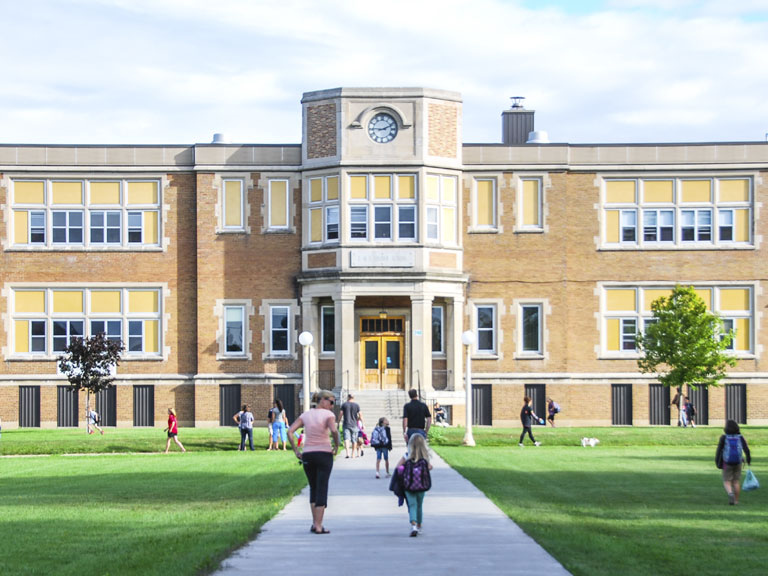County News
Revisions

School closures plan update due early next week
The 54 Accommodation Review Committee (ARC) members have done their job. The group of students, faculty, parents and County residents representing six County schools have read through hundreds of pages of documents, spoken to politicians, listened to their communities and done everything in their power to communicate their wants and needs to the school board.
Now, on Monday, the group, and the rest of the County, will have the opportunity to see the fruits of their labour. They will find out how much of their concerns have been heard, how much of their communication has gone through. They will find out how that might translate into an updated plan to accommodate a shrinking school population, ministry pressure—though waning—to cut budgets and to prevent damage to communities.
According to the school board’s communications manager, Kerry Donnell, the report will be presented to a committee of trustees set to look at student enrolment and school capacity on Monday. It could be online at the board’s website as early as Friday.
The report will include the original plan, comments from the ARC members and the public, and an updated plan.
“That recommendation may be the same as the initial recommendation or may be slightly amended or something different,” Donnell says.
The board’s original plan was to close Queen Elizabeth and Pinecrest in 2017, moving those students to Prince Edward Collegiate Institute (PECI). That school would be modified to serve kids from kindergarten to grade 12.
In 2018, the original plan prescribed closing Sophiasburgh Central School and sending those students to PECI as well.
Then, in 2020, both CML Snider and Kente public school would close, with all students from those schools, as well as students in grades 7 and 8 who graduate from Massassauga-Rednersville, would move to a newly built school in Wellington.
Among the major issues identified were the timelines involved, as well as the danger of causing harm to communities that have rallied around their schools.
Outside of the board office, it’s anyone’s guess what will be on the report. It’s not the end, either. Later in May, the same committee of trustees will listen to delegations from the public as they respond to the new plan. Nothing gets decided until June 19.
One of those delegations will likely be delivered by a representative of County council, expressing the municipal body’s concerns. Although the municipality has no decision-making power over the board, it has been welcomed to provide a voice in the process.
The County’s community development department will be providing that delegate a lot of information gathered over the course of the process. Neil Carbone, the department’s head, says that many concerns have come up.
“We have a lot of concern about the impact on our communities, on the settlement areas,” says Carbone. “There’s some concerns about future capacity, there’s concerns about the slippery slope of further erosion of our student base to the schools on the other side of the Bay [of Quinte]… a lot of concern that not all schools that should have been considered in the process, and that ties into some of that catchment area, and how that would influence students making the choice of where they would go for secondary school.”
Like many, Carbone says the County’s main concern lies in the board’s prophecy-fulfilling attitude that the County’s youth population will surely continue to shrink. Much of that is based on data collected before the County’s recent boom.
“Our concern is that the proposed structure will, almost by design, inhibit growth at the schools that remain, aside from Wellington. And there almost seems to be acknowledgement of that in not providing any growth in capacity at PECI after all is said and done,” says Carbone. “Anecdotally, we see growth of young families… and we know, in terms of interest in relocation to the County, it’s coming from the mid-career, new family demographics. That’s not proof that there’s potential for increased enrolment in these schools, but it’s at least cause to pause while making a decision that prevents you from moving forward.”
Like many of those who have participated, Carbone says the County is also concerned about the process itself.
“It’s okay if we went through a really excellent, community-driven process that took into account some of these other important factors and we arrived at the same recommendation, at least you can understand why that happened, and you can feel like the community had a hand in it,” says Carbone. “This feels like the decision was made a long time ago.” Sophiasburgh Central’s ARC group came up with a proposal to create a school that would offer specialized agricultural and culinary programming, with the support of the community. Carbone recognizes that school community’s passion, and points to it as a reason for closures to be a community and not a board decision.
“Everyone acknowledges that we’ve got capacity issues here, and that is probably having a detrimental effect on the quality of programming the board can offer to County students for the dollars that they have. Acknowledging something has to happen, some closures need to occur, some consolidations need to happen, I don’t think anybody disagrees with that, but it seems that what closes and where doesn’t take into account some important community issues.”
Those who are interested in reviewing the timeline and documents for Prince Edward County’s accommodation review process, as well as filling an application form for making deputations to the board committee on May 25, can do so by visiting hpedsb.on.ca/ec/directorsOffice/arc/PrinceEdwardCounty_accom modationreviews.html.

Comments (0)